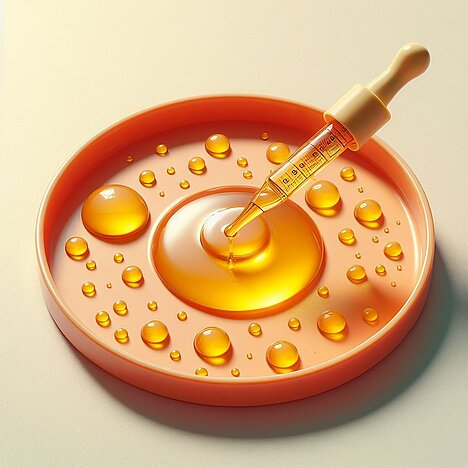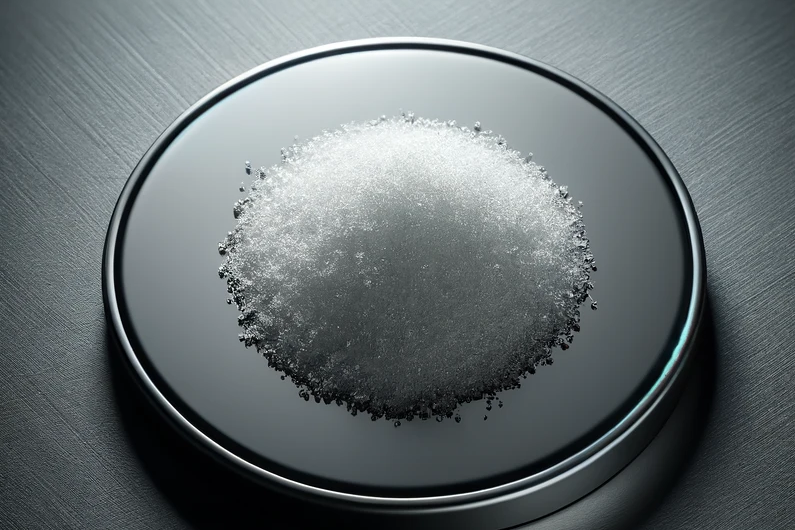Calcium benzoate

In the world of dog nutrition, constant scientific developments meet your watchful eye as a pet owner who only wants the best for their furry family member. One ingredient that always raises questions in this context is calcium benzoate. Although it is widely used in the human food industry, its role in our dogs' diets remains a topic of both interest and concern. In this article, we explore what exactly calcium benzoate is and the potential benefits and drawbacks of its use in dog food.
What is calcium benzoate?
Calcium benzoate, a calcium salt form of benzoic acid, is a preservative commonly used in the food and beverage industry to extend the shelf life of products and inhibit the growth of microorganisms such as bacteria, yeasts and molds. It is known in the European Union as food additive E213 and is found in a wide range of products, from beverages to confectionery and certain types of animal feed.
Benefits of calcium benzoate in dog food
Extended shelf life of dog food
The most obvious benefit of calcium benzoate is its ability to extend the shelf life of dog food. By inhibiting the growth of harmful microorganisms, calcium benzoate helps to keep the food fresh and safe for consumption. This is especially important for moist dog food, which is more susceptible to spoilage.
Protection against pathogens
By inhibiting the growth of bacteria and molds, calcium benzoate helps to prevent the formation of toxins and the spread of pathogens in the food. This can help reduce the risk of food poisoning and other diseases transmitted by perishable foods.
Disadvantages and risks of calcium benzoate for dogs
Potential health risks
Although calcium benzoate is considered a safe food additive for human consumption, there are concerns about its effects on the health of dogs. Some studies have shown potential negative health effects from ingesting large amounts of benzoic acid and its salts, including metabolic pathway disturbances and increased liver stress.
Allergic reactions
There have been reports of allergic reactions in some animals associated with food additives such as calcium benzoate. These reactions can range from skin rashes to more severe symptoms such as breathing difficulties, although such cases are rare.
Controversial long-term effects
The long-term effects of regular ingestion of calcium benzoate by dogs have not yet been fully researched. The concern is that continued exposure to artificial preservatives could cause health problems over time, although current research is inconclusive.
Calcium benzoate plays an important role in food preservation, including extending the shelf life and safety of dog food. While it offers clear benefits by inhibiting the growth of microorganisms, the potential health risks and long-term effects on dogs are an area that requires further research.
If you notice any signs of hypersensitivity or poisoning in your dog, you should see your vet immediately. We are not a substitute for a vet, but we try to be as accurate as possible. Every dog reacts differently and we recommend you get a second opinion or consult your vet if in doubt.
Stay healthy and take good care of your four-legged friend!😊
Similar to Calcium benzoate
Potassium benzoate (C7H5KO2) is the potassium salt of benzoic acid, a chemical compound used as a preservative in many foods, including pet food. Its main function is to inhibit the growth of...
Sodium benzoate (C7H5NaO2) is the sodium salt of benzoic acid, an organic compound that occurs naturally in some fruits and spices. It is often used as a synthetic preservative in foods,...
Potassium sorbate is the potassium salt of sorbic acid, a natural organic acid found in some fruits such as berries. Potassium sorbate has an antimicrobial effect, i.e. it inhibits the growth of...
Sodium sorbate has several benefits for dogs that should not be underestimated. Firstly, it can help to keep food fresh for longer and thus reduce food waste. This is not only good for the...



